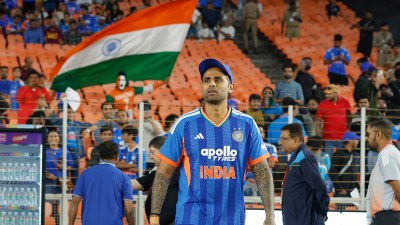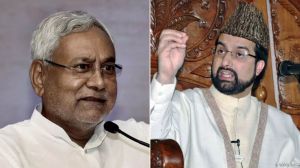The Election Commission of India (ECI) is once again sparring with a state government — this time West Bengal — over whether its officers can be disciplined. The state has refused to act against four officials accused of tampering with the electoral roll, saying that no election has been announced, and the Model Code of Conduct does not apply at this time.
The face-off has revived an old question: once government officials are placed on election duty, how far does the Commission’s disciplinary control extend?

Questions that the framers of the Constitution considered
Questions on the role and powers of the Election Commission were considered by the Constituent Assembly.
On June 15, 1949, Dr B R Ambedkar, chairman of the drafting committee, told members that the Chief Election Commissioner must enjoy the same protection as a judge of the Supreme Court so that “all matters relating to elections should be outside the control of the Executive Government of the day”.
The question of staffing was also discussed. Dr Ambedkar opposed the creation of a parallel bureaucracy for the Commission. He cautioned that “to allow the Election Commission to have an independent machinery to carry on all the work… would be really duplicating the machinery and creating unnecessary administrative expense which could be easily avoided for the simple reason… that the work of the Electoral Commission may be at times heavy and at other times it may have no work”.
Instead, Ambedkar argued, the Commission could “borrow [officials] from the provincial governments” — and while on deputation, those officials would be “responsible to the Commission and not to the Executive Government”.
In short, the framers of the Constitution imagined an Election Commission without its own permanent staff, but with authority over officers temporarily placed at its disposal.
Story continues below this ad
1988 Amendments: ECI formally given power over officials
In 1988, nearly four decades later, however, Parliament gave the intent of the Constituent Assembly legal force. Both the Representation of the People Acts of 1950 and 1951 were amended to make officials on election duty formally subject to the Commission’s control.
Section 13CC of the amended 1950 Act said that Chief Electoral Officers, District Election Officers, Electoral Registration Officers, and others working on electoral rolls “shall be deemed to be on deputation to the Election Commission”, and would be, during that period, subject to its “control, superintendence and discipline”.
Section 28A of the amended 1951 Act applied the same principle to the returning officers, the presiding and polling officers, and to even police personnel designated for election duty, covering the period from the notification of the election to the declaration of the result.
The continuing tussle: Seshan’s battles with the Centre
Yet even with the law on its side, the Commission’s tussles with governments did not end. The sharpest confrontation came during the tenure of T N Seshan, the famously combative Chief Election Commissioner (1990-96).
Story continues below this ad
Following the assassination of Rajiv Gandhi in 1991, elections were delayed, and were then held under heavy security. Seshan seized the moment to expand the number of officials directly under the ECI command: in that election, 3.5 million personnel manned 600,000 booths for a half-billion voters. Once drafted, Seshan declared, they would answer only to the Commission.
That insistence soon led to a clash. Seshan maintained that the law empowered him to discipline, suspend, or transfer errant officials. The ruling establishment rejected the idea. “That is something I was not willing to stomach,” Seshan told The Los Angeles Times in January 1994.
The crisis peaked in July 1993, during a byelection in Ranipet, Tamil Nadu.
Opposition MPs and MLAs complained that then Chief Minister J Jayalalithaa was blocking Congress workers from entering the constituency, and sought the deployment of central forces. Seshan relayed the request to the government, but was bluntly rebuffed.
Story continues below this ad
“On August 1, I got a letter from the government, saying that you have no authority to ask for Central forces,” he later recalled. (India Today, May 31, 1995).
The next day, Seshan retaliated. In an order dated August 2, 1993, the Election Commission declared that “till such time as the present deadlock, which is solely the making of the Government of India, is resolved, the Commission does not find itself in a position to carry out its constitutional obligations… All and every election under its control… shall remain postponed until further orders.”
With one stroke, Seshan had deferred 31 elections — three to Lok Sabha, nine to Rajya Sabha, two to state Councils and 17 to state Assemblies.
On September 10, the Commission moved the Supreme Court. It got interim relief, with the court affirming its authority over officers on election duty.
Story continues below this ad
The litigation, however, stretched on long after Seshan retired in 1996, until finally in 2000, under CEC M S Gill, a negotiated settlement was reached and the case was closed.
The 2000 agreement: ECI’s powers to discipline laid down
The settlement recorded by the court spelled out the Commission’s powers.
It could suspend officers for dereliction of duty, substitute them, and return them to their cadres with a conduct report. It could recommend disciplinary action to the competent authority, which would be bound to act within six months and inform the ECI.
The Centre agreed to advise states to follow the same framework. On November 7, 2000, the Department of Personnel and Training issued an Office Memorandum, followed by a letter to all states and Union Territories, directing compliance.
Story continues below this ad
For the first time, the ECI’s disciplinary powers were formally detailed on paper.
What now in West Bengal case: options before the ECI
As the current clash with West Bengal shows however, the 2000 settlement has not succeeded in putting an end to the friction.
Both the Commission and the Centre have had to repeat the terms of the settlement over the years — since states have sometimes refused to act on the directives issued by the ECI, or have accepted explanations offered by officers instead of enforcing disciplinary action.
If West Bengal continues to resist, the ECI has a few levers to pull. The first of these — to summon the state’s Chief Secretary — was used on August 13. A week’s deadline was set for compliance — which runs out on August 21.
Story continues below this ad
Next, the ECI can call on the Centre to impress upon the state the binding nature of the 2000 framework. And if that too fails, the Commission can move court, citing its powers under the Representation of the People Acts of 1950 and 1951.








































